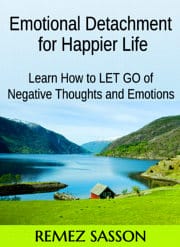
You might have come across the words ’emotional detachment’. If you read descriptions of what it is, you have probably read about its negative effects.
Healthline.com defines it as: “Emotional detachment is an inability or unwillingness to connect with other people on an emotional level. For some people, being emotionally detached helps protect them from unwanted drama, anxiety, or stress.”
Medicalnewstoday.com says: Emotional detachment refers to the inability of a person to fully engage with feelings of their own or those of others. It may interfere with a person’s physical, psychological, emotional, and social development.
Browse our online courses on meditation, positive thinking, overcoming procrastination, confidence, and freedom from distractions.
Wikipedia says: “People experiencing emotional detachment have a reduced ability to express emotion, to empathize with others or to form powerful emotional connections.”
Wikipedia also says positive things about it: “Emotional detachment can be a positive behavior which allows a person to react calmly to highly emotional circumstances.
“Emotional detachment in this sense is a decision to avoid engaging emotional connections, rather than an inability or difficulty in doing so.
“In this sense it can allow people to maintain boundaries, psychic integrity and avoid undesired impact by or upon others, related to emotional demands. As such, it is a deliberate mental attitude which avoids engaging the emotions of others.”
In this article I am talking about positive emotional detachment and about its benefits. I am talking about a useful habit, which can help you lead a happier life and rise above negative feelings, emotional manipulation and taking things personally.
What Is Emotional Detachment?
The philosophies of the Far East speak about this important skill, tough, of course they use different terms.
In India, the Sanskrit term ‘Vairagya’ is used, which roughly means dispassion, detachment, or renunciation. In Hindu philosophers ‘Vairagya’ is a means to achieve enlightenment.
The emotional detachment I am talking about here, is a state of calmness and non-involved with negative emotions and meaningless thoughts that pass through the mind.
This is not a state of indifference, and it does not mean lack of interest or lack of feelings.
People, who are indifferent, do not care about anything, and are usually passive. True detachment is something else. It is an attitude of common sense, open-mindedness and practical behavior.
People, who posses detachment, accept calmly whatever happens. They accept the good and the bad equally, because their mind is in a state inner balance and peace. If there is something they cannot do or change, it does not disturb their inner peace. If they are convinced of the importance of some action, they will pursue it whole-heartedly, and can ignore distractions easily.
People who acquire the skill of emotional detachment, accept both success and failure. If they succeed with what they do, that is fine, and if they don’t, they will either try again, or forget the matter and move on to something else.
They do not let failure, other people’s emotions, other people’s opinions, circumstance and situations, dictate how they feel and think and what they do.
How do you become emotionally detached?
Ask yourself:
- How many times you got emotionally involved with something against your will and better judgment.
- How many times have you got angry, frustrated or disappointed, due to what people said or did?
- How many times have your moods swung high and low?
- How often do you tell yourself that the next time you will stay cool and calm, and yet, every time you forget what you said?
I believe you agree with me when I say that in all these situations, a certain measure of detachment would have been most useful.
When it comes to personal matters, it is hard to stay emotionally uninvolved. You get involved, and this is quite natural, otherwise, life would have been boring. Involvement makes life ticking and active. However, a certain degree of emotional detachment would do wonders to your life.
This attitude is most useful in your daily life, in the pursuit of ambitions, and of course, on the spiritual path.
Examples of Emotional Detachment
1. Avoiding taking things personally
How do you feel, when somebody says something that you do not like hearing?
You would probably become angry, unhappy, or feel hurt.
Why is this so?
Because you value other’s people words and opinions more than you value your own thoughts and opinions. You let other’s people thoughts, words and actions influence your happiness, actions and reactions. You allow your happiness and your actions to be influenced by outside factors.
On the other hand, if you are able to stay detached, you will not be disturbed. You will stay calm. You will not waste hours thinking about the words people said and what they meant.
2. Spending time and energy on worries
When something worries you, do you spend hours on thinking about it, instead of investing time in finding a solution? Do you just get pulled into emotional thinking, worries, and fears?
This is a waste of time and energy. This state of affairs brings needless suffering and unhappiness.
3. Brooding on useless thoughts and feelings
Have you ever thought how much time and energy you waste every day brooding on useless thoughts and feelings? If you had detachment you could have avoided them.
Much of the anger, frustration, unhappiness and disappointments are due to lack of detachment.
4. Meditation
When meditating, a lot of thoughts keep coming into your mind, forcing you to pay them attention, and they also awaken associated feelings. This makes you become too involved with your thoughts, follow them, and forget about your meditation.
If you could display an attitude of emotional detachment toward your thoughts, it would have been easier to ignore them.
How to Be Emotionally Detached
I have talking here about positive detachment. I have been talking about the ability to rise above worries, petty thoughts and emotional agitation.
- How do you become emotionally detached from meaningless thoughts and meaningless feelings?
- Ho do you become emotionally detached from what is worrying you and disturbing your inner peace?
- What are the ways to gain positive emotional attachment?
There are various ways to do so. However, they all require some training, time and effort on your part.
You might recognize the importance of emotional detachment, but still do not make any effort to gain it.
You might also decide that this skill is too important to ignore, get out of your comfort zone, and start doing something about it.
What are the methods that can help you gain this skill?
1) Meditation might not be everyone’s cup of tea, but it is one of the essential means to get this skill.
Regular meditation, would in time, develop this skill in a most natural way. As you become more peaceful, your mind and feelings would become more peaceful and you will be able, effortlessly, express emotional detachment.
In meditation, you strive to ignore restless thoughts and feelings. This develops the habit of staying calm and emotionally detached, not only during meditation, but also in everyday life.
If you practice meditation, sooner or later, you will start to experience detachment. You will discover that you stay calm and undisturbed, under circumstances that previously made you anxious, stressed, angry or agitated. You will also find that you can handle your daily affairs of life in a calm and relaxed way.
2) Increasing your concentration skills, would also help you in gaining this skill. There are exercises that strengthen the focus and gives you the ability to control what goes in your mind.
3) Learning to wait a few seconds before reacting to things that bother you, would also help you develop this skill.
4) Developing a positive attitude is also a means to be able to reject negative and disturbing thoughts and emotions.
Emotional detachment, as described here, is not a morbid, limiting habit. On the contrary, it is a habit that leads to inner peace, freedom and power. It is a sign of inner strength, efficiency and common sense.
Learn About Our Online Meditation Course
Various meditation techniques for finding inner peace, expanding consciousness, and awakening.
Positive emotional detachment can help you get over petty matters, and it enables you to think in unlimited way. It helps you make decisions with common sense and lack of fear. It manifests as the ability to act calmly under all circumstances.
With this attitude, fewer things harass or bother you.
If you find this topic important and interesting, I highly recommend that you read my book Emotional Detachment for Happier Life. You will find in this book all the information you need, as well as practical guidance and instructions to get this skill.
Browse our online courses on meditation, positive thinking, overcoming procrastination, motivation, confidence, and freedom from distractions.



